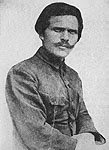Heute widmen wir uns einem Autor, der nahezu in Vergessenheit geraten ist und aus der Ahnengalerie des Anarchismus - wenn er denn überhaupt je dort aufgeführt wurde - längst gelöscht wurde, jedoch einer der meistgelesenen wissenschaftlichen Autoren seiner Zeit war: Herbert Spencer, der von Plechanow als "konservativer Anarchist" tituliert wurde, obwohl doch mit Ausnahme des Spätwerks recht wenig konservatives in seinen Werken zu finden ist. Für mich erscheint Spencer vielmehr als konsequenter Liberaler, der zwangsläufig zum Schluss kommt, dass die Anarchie als Schlusspunkt der menschlichen Evolution bzw. der Perfektabilität des Menschengeschlechts auch das ferne "Endziel" des Liberalismus ist (mehr über Spencer und den Anarchismus z.B. bei Chris Sciabarra, "Brainpolice" oder Roderick T. Long).
Fatal für das bleibende Vermächtnis Spencers war vor allem die häufig gemachte Verbindung zum Sozialdarwinismus (obwohl, wenn überhaupt, der Begriff des "Soziallamarckismus" angebracht wäre) - ein Begriff, der heute wiederum nicht ohne gedankliche Verbindung zu Hitler, zum Nationalsozialismus und letztlich zu Auschwitz gebraucht wird. Um dem Leser zu erlauben, sich selbst ein Urteil zu bilden, habe ich heute denn auch keinen staatskritischen Text von Spencer empfohlen (den bekanntesten davon, "The right to ignore the State" findet man z.B. hier), sondern gerade einer derjenigen Passagen die ihm das Adjektiv "sozialdarwinistisch" eingebracht haben: das zweite Kapitel von Social Statics (1851).
The Evanescence of Evil.
§ 1.
All evil results from the non-adaptation of constitution to conditions. This is true of everything that lives. Does a shrub dwindle in poor soil, or become sickly when deprived of light, or die outright if removed to a cold climate? it is because the harmony between its organization and its circumstances has been destroyed. Those experiences of the farmyard and the menagerie which show that pain, disease, and death, are entailed upon animals by certain kinds of treatment, may all be generalised under the same law. Every suffering incident to the human body, from a headache up to a fatal illness—from a burn or a sprain, to accidental loss of life, is similarly traceable to the having placed that body in a situation for which its powers did not fit it. Nor is the expression confined in its application to physical evil; it comprehends moral evil also. Is the kindhearted man distressed by the sight of misery? is the bachelor unhappy because his means will not permit him to marry? does the mother mourn over her lost child? does the emigrant lament leaving his fatherland? are some made uncomfortable by having to pass their lives in distasteful occupations, and others from having no occupation at all? the explanation is still the same. No matter what the special nature of the evil, it is invariably referable to the one generic cause—want of congruity between the faculties and their spheres of action.
§ 2.
Equally true is it that evil perpetually tends to disappear. In virtue of an essential principle of life, this non-adaptation of an organism to its conditions is ever being rectified; and modification of one or both, continues until the adaptation is complete. Whatever possesses vitality, from the elementary cell up to man himself, inclusive, obeys this law. We see it illustrated in the acclimatization of plants, in the altered habits of domesticated animals, in the varying characteristics of our own race. Accustomed to the brief arctic summer, the Siberian herbs and shrubs spring up, flower, and ripen their seeds, in the space of a few weeks. If exposed to the rigour of northern winters, animals of the temperate zone get thicker coats, and become white. The greyhound which, when first transported to the high plateaus of the Andes, fails in the chase from want of breath, acquires, in the course of generations, a more efficient pair of lungs. Cattle which in their wild state gave milk but for short periods, now give it almost continuously. Ambling is a pace not natural to the horse; yet there are American breeds that now take to it without training.
Man exhibits just the same adaptability. He alters in colour according to temperature—lives here upon rice, and there upon whale oil—gets larger digestive organs if he habitually eats innutritious food—acquires the power of long fasting if his mode of life is irregular, and loses it when the supply of food is certain—becomes fleet and agile in the wilderness and inert in the city—attains acute vision, hearing, and scent, when his habits of life call for them, and gets these senses blunted when they are less needful. That such changes are towards fitness for surrounding circumstances no one can question. When he sees that the dweller in marshes lives in an atmosphere which is certain death to a stranger—when he sees that the Hindoo can lie down and sleep under a tropical sun, whilst his white master with closed blinds, and water sprinklings, and punkah, can hardly get a doze—when he sees that the Greenlander and the Neapolitan subsist comfortably on their respective foods—blubber and macaroni, but would be made miserable by an interchange of them—when he sees that in other cases there is still this fitness to diet, to climate, and to modes of life, even the most sceptical must admit that some law of adaptation is at work. Nay, indeed, if he interprets facts aright, he will find that the action of such a law, is traceable down to the minutest ramifications of individual experience. In the drunkard who needs an increasing quantity of spirits to intoxicate him, and in the opium eater, who has to keep taking a larger dose to produce the usual effect, he may mark how the system gradually acquires power to resist what is noxious. Those who smoke, who take snuff, or who habitually use medicines, can furnish like illustrations. Nor in fact, is there any permanent change of bodily state or capability, which is not to be accounted for on the same principle.
This universal law of physical modification, is the law of mental modification also. The multitudinous differences of capacity and disposition that have in course of time grown up between the Indian, African, Mongolian and Caucasian races, and between the various subdivisions of them, must all be ascribed to the acquirement in each case of fitness for surrounding circumstances. Those strong contrasts between the characters of nations and of times awhile since exemplified (...) admit of no other conceivable explanation. Why all this divergence from the one common original type? If adaptation of constitution to conditions is not the cause, what is the cause?
There are none, however, who can with anything like consistency combat this doctrine; for all use arguments that presuppose its truth. Even those to whose prejudices the theory of man’s indefinite adaptability is most opposed, are continually betraying their involuntary belief in it. They do this when they attribute differences of national character to differences in social customs and arrangements: and again when they comment on the force of habit: and again when they discuss the probable influence of a proposed measure upon public morality: and again when they recommend practice as a means of acquiring increased aptitude: and again when they describe certain pursuits as elevating and others as degrading: and again when they talk of getting used to anything: and again when they advocate certain systems of mental discipline—when they teach that virtuous conduct eventually becomes pleasurable, and when they warn against the power of a long-encouraged vice.
In fact, if we consider the question closely, no other arrangement of things can be imagined. For we must adopt one of three propositions. We must either affirm that the human being is wholly unaltered by the influences that are brought to bear upon him—his circumstances as we call them; or that he perpetually tends to become more and more unfitted to those circumstances; or that he tends to become fitted to them. If the first is true, then all schemes of education, of government, of social reform—all instrumentalities by which it is proposed to act upon man, are utterly useless, seeing that he cannot be acted upon at all. If the second is true, then the way to make a man virtuous is to accustom him to vicious practices, and vice versâ. Both of which propositions being absurd, we are compelled to admit the remaining one.
§ 3.
Keeping in mind then the two facts, that all evil results from the non-adaptation of constitution to conditions; and that where this non-adaptation exists it is continually being diminished by the changing of constitution to suit conditions, we shall be prepared for comprehending the present position of the human race.
By the increase of population the state of existence we call social has been necessitated. Men living in this state suffer under numerous evils. By the hypothesis it follows that their characters are not completely adapted to such a state.
In what respect are they not so adapted? what is the special qualification which the social state requires?
It requires that each individual shall have such desires only, as may be fully satisfied without trenching upon the ability of other individuals to obtain like satisfaction. If the desires of each are not thus limited, then either all must have certain of their desires ungratified; or some must get gratification for them at the corresponding expense of others. Both of which alternatives necessitating pain, imply non-adaptation.
But why is not man adapted to the social state?
Simply because he yet partially retains the characteristics that adapted him for an antecedent state. The respects in which he is not fitted to society are the respects in which he is fitted for his original predatory life. His primitive circumstances required that he should sacrifice the welfare of other beings to his own; his present circumstances require that he should not do so; and in as far as his old attribute still clings to him, in so far is he unfit for the social state. All sins of men against each other, from the cannibalism of the Carrib to the crimes and venalities that we see around us; the felonies that fill our prisons, the trickeries of trade, the quarrelings of nation with nation, and of class with class, the corruptness of institutions, the jealousies of caste, and the scandal of drawing-rooms, have their causes comprehended under this generalization.
Concerning the present position of the human race, we must therefore say, that man needed one moral constitution to fit him for his original state; that he needs another to fit him for his present state; and that he has been, is, and will long continue to be, in process of adaptation. By the term civilization we signify the adaptation that has already taken place. The changes that constitute progress are the successive steps of the transition. And the belief in human perfectibility, merely amounts to the belief, that in virtue of this process, man will eventually become completely suited to his mode of life.
§ 4.
If there be any conclusiveness in the foregoing arguments, such a faith is well founded. As commonly supported by evidence drawn from history, it cannot be considered indisputable. The inference that as advancement has been hitherto the rule, it will be the rule henceforth, may be called a plausible speculation. But when it is shown that this advancement is due to the working of a universal law; and that in virtue of that law it must continue until the state we call perfection is reached, then the advent of such a state is removed out of the region of probability into that of certainty. If any one demurs to this, let him point out the error. Here are the several steps of the argument.
All imperfection is unfitness to the conditions of existence.
This unfitness must consist either in having a faculty or faculties in excess; or in having a faculty or faculties deficient; or in both.
A faculty in excess, is one which the conditions of existence do not afford full exercise to; and a faculty that is deficient, is one from which the conditions of existence demand more than it can perform.
But it is an essential principle of life that a faculty to which circumstances do not allow full exercise diminishes; and that a faculty on which circumstances make excessive demands increases.
And so long as this excess and this deficiency continue, there must continue decrease on the one hand, and growth on the other.
Finally all excess and all deficiency must disappear; that is, all unfitness must disappear; that is, all imperfection must disappear.
Thus the ultimate development of the ideal man is logically certain—as certain as any conclusion in which we place the most implicit faith; for instance, that all men will die. For why do we infer that all men will die? Simply because, in an immense number of past experiences, death has uniformly occurred. Similarly then as the experiences of all people in all times—experiences that are embodied in maxims, proverbs, and moral precepts, and that are illustrated in biographies and histories, go to prove that organs, faculties, powers, capacities, or whatever else we call them, grow by use and diminish from disuse, it is inferred that they will continue to do so. And if this inference is unquestionable, then is the one above deduced from it—that humanity must in the end become completely adapted to its conditions—unquestionable also.
Progress, therefore, is not an accident, but a necessity. Instead of civilization being artificial, it is a part of nature; all of a piece with the development of the embryo or the unfolding of a flower. The modifications mankind have undergone, and are still undergoing, result from a law underlying the whole organic creation; and provided the human race continues, and the constitution of things remains the same, those modifications must end in completeness. As surely as the tree becomes bulky when it stands alone, and slender if one of a group; as surely as the same creature assumes the different forms of cart-horse and race-horse, according as its habits demand strength or speed; as surely as a blacksmith’s arm grows large, and the skin of a labourer’s hand thick; as surely as the eye tends to become long-sighted in the sailor, and short-sighted in the student; as surely as the blind attain a more delicate sense of touch; as surely as a clerk acquires rapidity in writing and calculation; as surely as the musician learns to detect an error of a semitone amidst what seems to others a very babel of sounds; as surely as a passion grows by indulgence and diminishes when restrained; as surely as a disregarded conscience becomes inert, and one that is obeyed active; as surely as there is any efficacy in educational culture, or any meaning in such terms as habit, custom, practice;—so surely must the human faculties be moulded into complete fitness for the social state; so surely must the things we call evil and immorality disappear; so surely must man become perfect.










Keine Kommentare:
Kommentar veröffentlichen